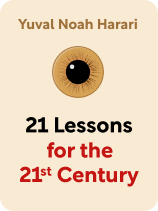

This article is an excerpt from the Shortform book guide to "21 Lessons for the 21st Century" by Yuval Noah Harari. Shortform has the world's best summaries and analyses of books you should be reading.
Like this article? Sign up for a free trial here .
What are the biggest problems of the 21st century? Why can’t these problems be solved with nationalist politics?
According to Yuval Noah Harari, an Israeli public intellectual and author of 21 Lessons for the 21st Century, the biggest problems of the 21st century are all global in nature, and therefore, they require an international response. They are three of them: 1) the nuclear threat, 2) the climate change, and 3) the dual rise of bio- and info-tech.
Keep reading to learn about the three major 21st-century problems, according to Yuval Noah Harari.
What Are the Biggest Problems of the 21st Century?
While many people are focusing on the issues and interests of their own nations, the biggest problems of the 21st century are global, and therefore can’t be solved with nationalist approach. They are:
1) The nuclear challenge: Once nuclear power became a tool of war, the threat of war meant the possibility of massive destruction. This threat was front-of-mind during the Cold War, so America, Europe, China, and the Soviet Union significantly changed geopolitical dynamics in order to avoid massive killing and nuclear annihilation. As a result, all war has declined—but with Brexit, the United Kingdom threatens this balance by abandoning the European Union and isolating itself in nationalism. The loss of multinational cooperation and the rise in nationalism could lead to war and nuclear devastation.
2) The ecological challenge: In recent decades, humans have accelerated the pace of environmental degradation. As a result, climate change threatens to make many plants and animals extinct, destroy ecological systems, cause more severe weather, hurt agricultural production, and make large areas of the globe uninhabitable. If humans don’t significantly change their behavior soon, environmental decline will reach a tipping point from which there’s no return.
While individual nations can overhaul environmental practices, raise taxes on emissions, and develop eco-friendly technologies, the effort won’t be enough unless the whole world participates. Further complicating the matter is the fact that some countries have more incentive to reform than others: Some nations’ economies rely on exporting fossil fuels, while others would gladly stop importing those fuels if a more affordable alternative existed. Additionally, climate change threatens to flood some nations with rising sea levels, while geological changes could actually benefit other nations. And since the effects of climate change are long-term (though looming increasingly imminently), it’s difficult for some countries to prioritize green policies over the short-term economic pains of reform.
3) The technological challenge: The simultaneous rise of both infotech and biotech threatens to transform the economy, labor market, social and political power, and even the biological makeup of humans. A nationalist viewpoint simply doesn’t think big enough to take on such a wide-reaching issue. Like climate change, if the United States imposes policies restricting certain technological development, those laws don’t prevent China from pursuing research—and when the U.S. and other countries see China developing new technologies, they’ll be likely to do the same to avoid being left behind in a competitive, nationalistic world. Additionally, whereas people can universally agree that global warming and nuclear destruction are bad, there are a wide range of opinions on the ethics of technological developments in AI and bioengineering, which would lead to different guidelines in each country. In order to avoid a dangerous snowball of technological development, nations need to reach an international agreement on ethical guidelines to guide technological innovation and adoption.
Tackle Challenges as a Global Community
Each of these three challenges individually threatens devastation—and, taken together, each one exacerbates the others, creating a vicious cycle. As climate change increases the frequency of severe weather, leads to food shortages, and puts people out of their homes, technological development is likely to accelerate in a desperate search for solutions. As technological development progresses, increasing tension and competition among nations could raise the likelihood of nuclear war. Growing tensions or an all-out war will make it all but impossible to work together to combat climate change or create guidelines for limiting the development of AI.
Since the problems of the 21st century are all global in nature, it makes no sense to address them with nationalist politics. Just as tribes merged into nations in order to tackle issues that were too big for a single tribe, nations now need to merge to tackle these problems that are too big for any individual country to solve. This doesn’t mean that you can’t be patriotic, maintain cultural traditions, and uphold your national identity. However, in doing so, you must also consider the best interest of the global community—because the global nature of these problems means that whatever is in the best interest of the world is also in the best interest of each nation.
You probably already maintain multiple simultaneous loyalties: You’re loyal to your family, your school, your company, your neighborhood, your city, and your country. Add to that a loyalty to your global civilization. Occasional conflicts among your loyalties are inevitable—for example, your city may propose a change that benefits the city as a whole but creates more traffic in your neighborhood. These conflicts are not insurmountable: If municipal, state, and national politics address issues with consideration for the global impact, people can take care of their compatriots by working in the best interest of the entire globe.
Religion Can’t Solve 21st Century Problems
If political models, governments, and scientists have failed to provide answers for how to navigate the 21st century problems, could religion hold the answers? In order to explore this, we’ll look at three areas where religion falls short:
1) Technical problems, such as how African farmers should deal with droughts caused by climate change. Religion can’t solve technical problems—science can. Humans’ ancestors constantly turned to religion to solve technical problems, such as when priests prayed for rain to nourish farmers’ lands and shamans healed the ill. However, as scientific knowledge has grown, science has gradually replaced religion as the solution to technical problems: Farmers now consult meteorologists and plant drought-resistant crops, and sick people seek treatments from doctors. Religion has remained as merely a supplemental presence in these matters, adding prayers to scientific solutions.
Religious leaders aren’t experts in agriculture, medicine, and other technical fields—they are experts of interpretation, which makes them adept at offering explanations for droughts and illness, rather than solutions. By contrast, scientists hone in on a single subject and use trial and error to find solutions that work. This is why science has not only replaced religion as an authority for technical problems, but also why it has been adopted across different religions and cultures throughout the global civilization.
2) Policy problems, such as how governments should prevent climate change to begin with. As is the case with technical problems, religion doesn’t offer expertise in solving policy problems. From the Bible to the Quran, the wisdom in ancient texts doesn’t apply directly to the context of modern times, at least as far as policy goes. Instead, religious and political leaders typically look for answers from modern sources, and then find a passage from a religious text that can be interpreted to justify the decision. In other words, religion is used to justify solutions, but it does not provide solutions to policy problems. This becomes clear when followers of the same religious text reach two different conclusions on the same issue—for example, American evangelicals cite the Bible in their opposition to environmental regulations, while Pope Francis declares that fighting climate change is a religious duty.
3) Identity problems, such as whether Americans should even worry about the plight of African farmers. Whereas religion is irrelevant to technical and policy problems, it contributes greatly to identity problems—but it serves to divide rather than to unite. Despite overwhelming similarities among different faiths, religions use ceremonies, rites, and rituals to reinforce followers’ connection to a particular religion, which inherently sets them apart from other religions. For example, regular worship is a cornerstone of many faiths, but its distinct forms make the practices look more different than alike: Muslims kneel in prayer five times a day, Jews gather for a meal and prayers on Friday nights, and Christians go to church on Sunday mornings.
Through creating ways for followers to distinguish themselves from others, religions create cultures and mass identities with which followers can align. Mass identities make mass cooperation possible, and mass cooperation is necessary to harness human power to tackle large issues. The same principles easily translate to nationalism. However, whether through nationalism or religion, narrowly defined identities and loyalties work against the global cooperation needed to take on the nuclear, ecological, and technological problems of the 21st century.

———End of Preview———
Like what you just read? Read the rest of the world's best book summary and analysis of Yuval Noah Harari's "21 Lessons for the 21st Century" at Shortform .
Here's what you'll find in our full 21 Lessons for the 21st Century summary :
- What the unique challenges of the 21st century are and will be
- Why religion can't solve these 21st-century challenges
- How algorithms like Netflix recommendations are teaching you not to trust yourself






